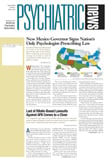What happens to a woman with situational depression on the open insurance market?
Consider the fate of Emily, a 56-year-old woman whose husband died suddenly in January 2000. She is 5 feet, 4 inches tall, weighs 125 pounds, and does not smoke. Since her husband’s death, she has suffered from situational depression, and her internist prescribed 20 mg of fluoxetine a day; otherwise, she is in excellent health.
With the help of Nicholas Meyers of APA’s Division of Government Relations, Karen Pollitz, project director of Georgetown University’s Institute for Health Care Policy and Research, created the hypothetical character of Emily and then sent her medical record to 60 insurance companies as part of a study of the availability of insurance to individuals.
The 60 insurance companies are in eight communities that are diverse in size and geographic location. They are in states that set few limits on medical underwriting by carriers in the individual market. From six to nine insurers participated in each market.
Insurers were fairly evenly divided on whether to reject Emily, apply a surcharge to the premium, or impose both benefit limits and a premium surcharge. Overall, Emily received 46 offers (77 percent), including nine offers of standard coverage at the standard rate, and 14 denials (23 percent).
Twenty-three offers imposed restrictions on covered benefits including these:
• One excluded treatment for depression.
• Six excluded treatment for all mental/nervous disorders.
• Eight increased cost sharing for psychotropic drugs.
• Seven increased the cost sharing for all prescription drugs and imposed coinsurance (paying a percentage of the fee rather than a copay) on all doctor visits.
Almost two-thirds (30) of Emily’s offers imposed premium surcharges, averaging 26 percent. The average premium offered to Emily was $338 a month, or $4,056 a year. Monthly premiums ranged from a high of $916 to a low of $160. In most markets, the cost of coverage offered Emily varied by a factor of 2:1 or more. Her offers ranged in price from $1,920 to $10,992 a year.
Of the 60 policies studied, six policies had no coverage for mental health or substance abuse. Low lifetime and annual caps were used most often to limit coverage for mental health care. Twenty-seven policies imposed lifetime caps, usually of $10,000. By comparison, lifetime caps for other health services ranged from $1 million to $6 million under all of the policies studied. Thirty-three policies imposed annual caps, usually of $3,500 or less.
In large group health plans, the Mental Health Parity Act of 1996 requires parity in the application of aggregate lifetime and annual dollar limits on mental health benefits with dollar limits on other medical/surgical benefits. The act does not require parity for other terms of mental health coverage (such as cost sharing or the number of covered visits), nor does it apply to substance abuse benefits.
